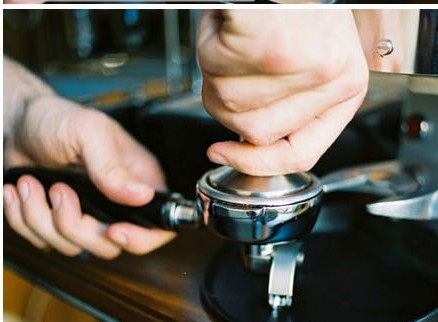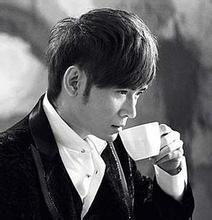Spresso production: grinding coffee powder introduction of medium and fineness of coarse and fine coffee powder
First of all, the strength of powder pressing is not a condition for adjusting the degree of grinding. The strength of powder pressing should be relatively stable. After adjusting the degree of grinding, the strength of the pressing powder can be adjusted appropriately, either large (when the degree of grinding is slightly thickened) or smaller (when the degree of grinding is slightly adjusted). In order to make the coffee flavor performance more stable. In other words, the degree of grinding is a factor that affects the strength of the powder to a certain extent, not with the change of the strength of the powder, but in the case of the adjustment of the degree of grinding.
The freshness of coffee beans is one of the factors affecting the grinding degree. Freshly roasted coffee beans because of the high activity of flavor components, do not need too fine grinding degree to emit enough flavor, so the grinding degree can be adjusted properly. At this time, if you still take a fine degree of grinding, coffee bean flavor components can be more divergent, but at this time it is easier to extract miscellaneous flavor and astringent taste, under the balance, it is more appropriate to use a thicker degree of grinding. On the other hand, with the decline of the freshness of coffee beans, it is necessary to use fine grinding to extract the flavor components that have lost their activity.
The change of humidity is also one of the factors affecting the degree of grinding. When the humidity is relatively high, the wet speed of the ground coffee powder is very fast, and there is already a slight humidity when filling the powder and cloth powder. If a fine grinding degree is used, the coffee flavor components have already reacted with the air with high humidity and become messy and impure, while the coffee powder is easier to be compacted and the extraction process is longer, which makes it easier to extract the bad taste and make the overall coffee taste muddy. Therefore, in the case of relatively high humidity, it is not suitable for a finer degree of grinding, it will be better to use a slightly thicker degree of grinding. On the other hand, in the case of relatively low humidity, coffee powder is ground out after contact with the air, the speed of oxidation reaction will also be accelerated, if the coarse grinding degree is used, then the coffee powder oxidation and flavor composition changes together make the extracted coffee taste will be less, lack of depth and mellow feeling, so the degree of grinding should be adjusted appropriately. Of course, after adjusting the degree of grinding, the corresponding adjustment of powder strength is also necessary.
Humidity factors play a role not only in sunny and rainy days, but also at different times of the day. Generally speaking, the humidity in the morning and evening is higher than that at noon, so according to the influence of humidity factors, the grinding degree should be thickened in the morning and evening, and finer at noon.
There are many other factors that affect the degree of grinding, including the roasting degree of coffee beans (although coffee beans used by Espresso should use a deeper roasting degree, but sometimes different roasting degrees may be used to roast formula beans for richer taste), blended recipes, and so on. All of the above are the most common and can be mastered by baristas. The previous sections are all about the adjustment of the basic factors in the production process in order to meet that taste standard on the premise of understanding the good taste of Espresso (see the taste of Espresso). There are many places in the world of Espresso that we don't fully understand, and we would like to explore this wonderful world of coffee with you.
Grinding refers to the process of grinding coffee beans into the coffee powder used in making coffee by using a bean grinder (or manual grinding apparatus), and the degree of grinding refers to the thickness of the coffee powder. So what is the impact of the degree of grinding on Espresso production? Today, let's take a look at the impact of grinding on the production of Espresso.
Because Espresso uses a coffee machine, about 95 ℃ of hot water passes through coffee pressed powder at 9 atmospheric pressure, and the coffee is extracted for 25 seconds to 30 seconds to get about 30cc coffee. The extraction time is short and the coffee pressed powder is under great pressure, which puts forward a requirement for the grinding degree of coffee powder, which is different from that used in other coffee production methods-the coffee powder for making Espresso should be fine grinding.
What is fine grinding? If the degree of grinding of coffee powder is roughly divided into fine grinding, medium grinding and coarse grinding, then the drip filter may be more suitable for coarse grinding, while handbrewed coffee and siphon pots may be more suitable for medium roughness, while mocha pots are more suitable for fine grinding, compared with the coffee powder for Espresso.
Therefore, the degree of grinding of coffee powder made of Espresso should belong to fine grinding or fine grinding.
So what effect would it have on the production of coffee if not for the use of this degree of grinding?
The production of Espresso has strict requirements on the grinding degree of coffee powder. Assuming that there is a suitable grinding range, then this range is also quite small, a slight change in the grinding degree of coffee powder will have a great impact on the coffee produced. This effect can be seen even in the process of making coffee. For example, if you thicken the degree of grinding a little bit, under the same other conditions, you will find that the extraction time of 30cc coffee becomes shorter, and although the extraction state of coffee is stable, the color of coffee quickly becomes lighter; if you adjust the degree of grinding slightly, you will find that the time of extraction of 30cc coffee is longer, and the coffee has finer rheology and darker color. The taste of coffee made in these two cases will be very different, and there will be a significant difference between coffee made with a more appropriate degree of grinding.
Some people may say that since the degree of grinding has been adjusted, other elements should be adjusted accordingly to match the adjustment of the degree of grinding. For example, now that the grinding degree is thickened, the strength of the pressing powder should be increased to make the coffee pressed powder denser so as to achieve the purpose of prolonging the extraction time, on the contrary, the detailed rules of grinding degree adjustment should reduce the powder pressing force. It seems to be so, but it is not appropriate to do so.
First of all, the strength of pressing powder is formed by finding a familiar feeling after a long time of repeated practice, so the practice of constantly changing the strength of pressing powder with the grinding degree is not conducive to better mastering the feeling of pressing powder, and it can not be changed to exactly the degree you want at once, but the feeling of strength is more inaccurate over time. Even under the right grinding degree, the coffee production will fail because of the inaccurate strength of the powder pressing.
Second, even if you change the degree of grinding and change other factors to make the coffee more in line with the requirements mentioned in the definition, it will be different from the coffee made at the right degree of grinding. the difference lies in the taste of the coffee. Because of the change of grinding degree and the change of the surface area of coffee powder, the coffee ingredients extracted at the same time are different. In fact, as long as we understand that we want to get a cup of Espresso that meets the definition and has a good taste, rather than a coffee that is light or muddy and complex in taste, we can understand why the right degree of grinding is so important.
So does it mean that the degree of grinding can not be changed? What factors will affect the degree of grinding? In the next article, we will continue to learn about the factors that affect the grindability of the coffee powder that makes Espresso.
Source: happy Coffee Xiao Xu's blog
Important Notice :
前街咖啡 FrontStreet Coffee has moved to new addredd:
FrontStreet Coffee Address: 315,Donghua East Road,GuangZhou
Tel:020 38364473
- Prev

Espresso production: factors that should be paid attention to Coffee Powder pressing skills and strength Powder Compressor
Previous blog posts have introduced a variety of factors that affect the taste of Espresso. Here is only one of these factors, which is also a very important step in the process of making Espresso. What is assumed here is the ideal state, leaving aside other factors, powder amount, water temperature, degree of grinding, humidity, water pressure, etc., and only consider pressing powder.
- Next

Teach you how to taste coffee in a short time? How to learn to drink coffee in 3 minutes?
Many people may go to cafes for two purposes: to keep their brains awake and to get free WIFI. However, there is no denying that this brown-black liquid has another function, which is to make people feel the pleasure of smell and taste. But even if you buy a nice bag of coffee beans or enter a well-reviewed cafe, you still need some simple but appropriate ways to fill it.
Related
- Beginners will see the "Coffee pull flower" guide!
- What is the difference between ice blog purified milk and ordinary milk coffee?
- Why is the Philippines the largest producer of crops in Liberia?
- For coffee extraction, should the fine powder be retained?
- How does extracted espresso fill pressed powder? How much strength does it take to press the powder?
- How to make jasmine cold extract coffee? Is the jasmine + latte good?
- Will this little toy really make the coffee taste better? How does Lily Drip affect coffee extraction?
- Will the action of slapping the filter cup also affect coffee extraction?
- What's the difference between powder-to-water ratio and powder-to-liquid ratio?
- What is the Ethiopian local species? What does it have to do with Heirloom native species?

